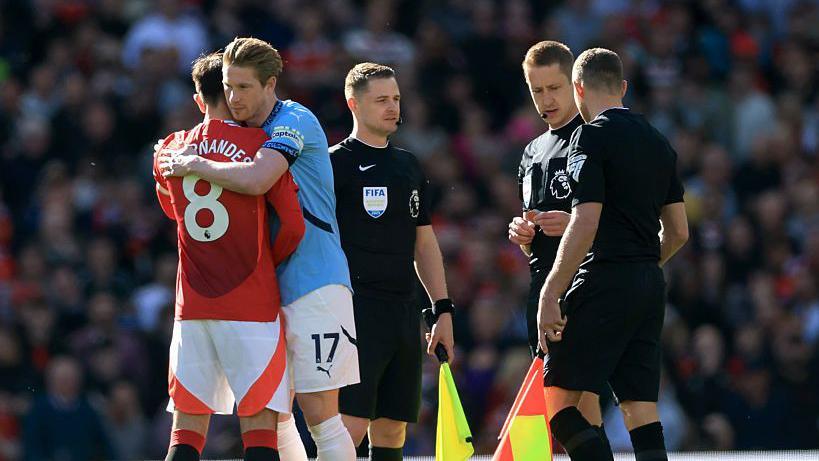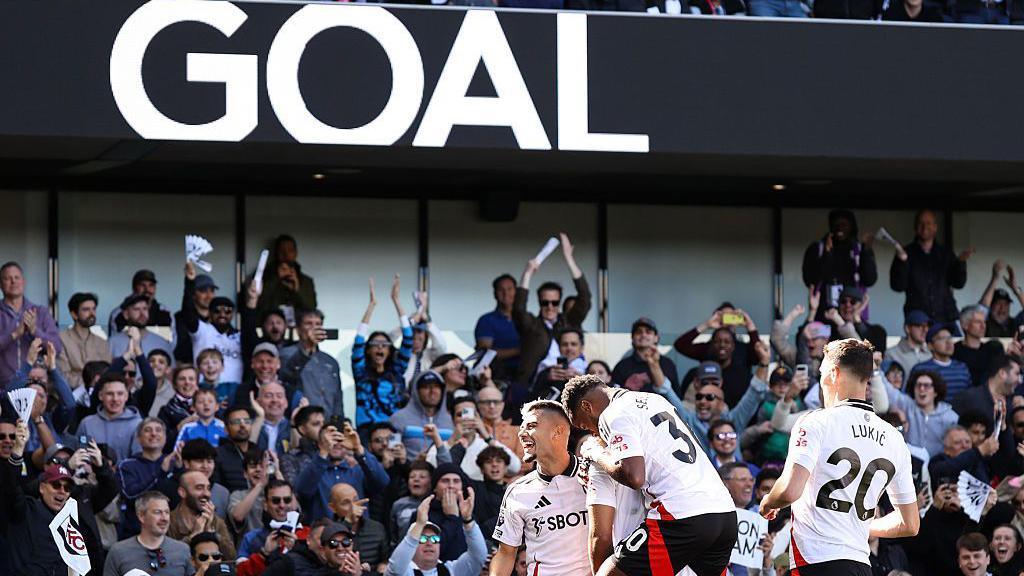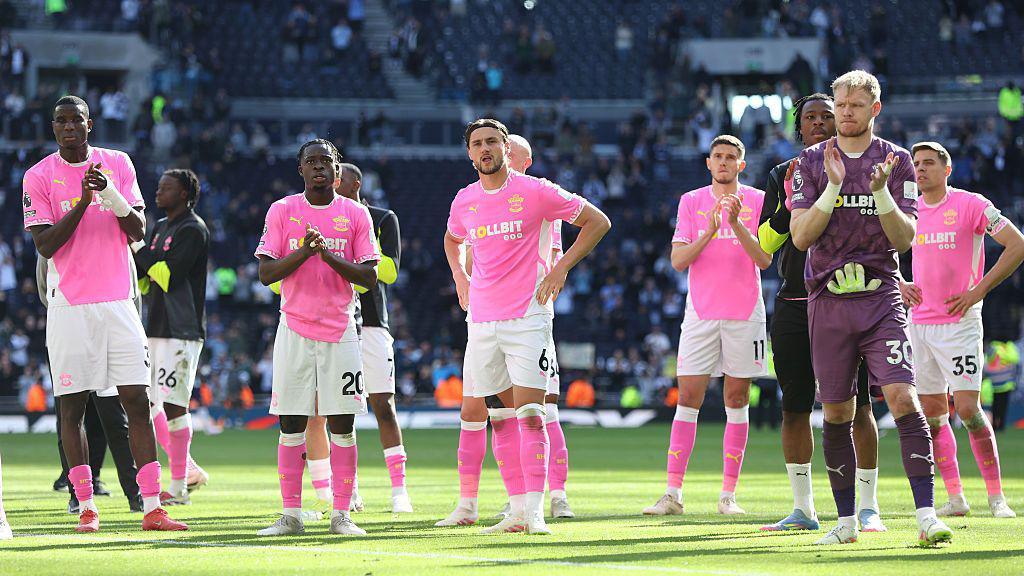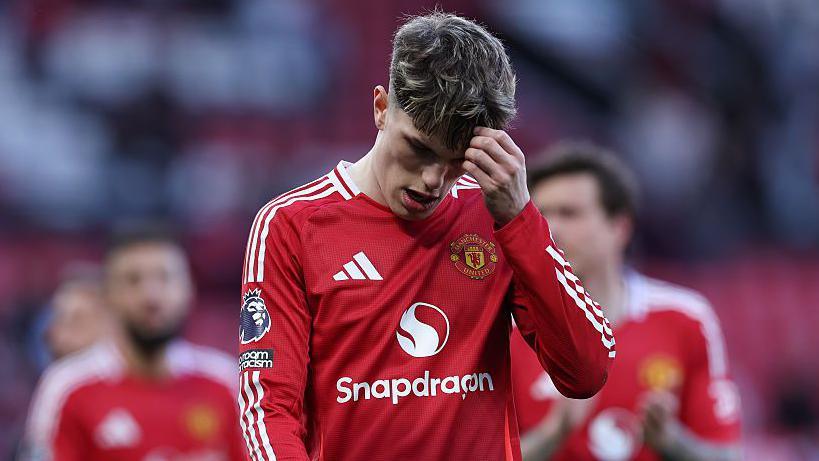Has 'micro-managed' Premier League become boring?

Manchester United v Manchester City was the 28th 0-0 draw in the Premier League this season - there were just 11 last year
- Published
Despairing at the end of a dire goalless Manchester derby, Gary Neville railed against not only the poor performances of the two teams but the state of Premier League football in general.
"This robotic nature of not leaving our positions, being micro-managed within an inch of our lives, not having any freedom to take a risk to go and try and win a football match is becoming an illness in the game," lamented Neville. "It's becoming a disease in the game."
His comments wiggled a finger in a wound which has been festering for some fans of top-flight football this season - the idea that the Premier League has become boring.
That sentiment is in stark contrast to another epic week of dramatic Champions League knock-out football.
So how true is this 'boring Premier League' claim?
Passes up, dribbles down - can you 'measure' boring?

Before moving into punditry, Gary Neville made 397 Premier League appearances for Manchester United
First, to address Neville's comments directly - are players now "robotic" and unable to take risks?
Certainly the stats indicate the average Premier League match is now more focused on passing rather than taking an opposition player on.
This season, according to Opta, there has been an average of 897 passes per game, approaching the record of 945 set in 2020-21.
Compare this to an average of 34.7 dribbles being attempted per game, which is the lowest in the Premier League since 2018-19. Of the dribbles attempted, only 46% have been completed - indicating players are not so used to trying to take defenders on.
There have only been 24 crosses per game too, forming part of a major downward trend in the league over the past two decades - that figure was as high as 42 per game in 2003-04.
This can, in part, be put down to Manchester City - as the most successful Premier League side of recent years until this season, their pass-heavy style under Pep Guardiola has influenced the division.
"I was brainwashed by Guardiola, but in a good way," former City player Danilo recently told The Guardian., external "It was like I was at university. It's not that I was an idiot before I arrived at Manchester City, but I realised that I played football in completely the wrong way."
Which raises a key counterpoint to Neville's view, as voiced by Chris Sutton on the BBC's Monday Night Club.
"What's the difference between coaching and micro-management?" Sutton asked. "When Man City were on top of the game they had a style of play and a freedom. Everybody has a role to play, but Guardiola will not put anyone in a straitjacket."
Teams keeping possession has helped remedy somewhat one of the persistent ills in the Premier League of recent seasons - the low amount of time the ball has actually been active during a game.
The ball this season has been in play during games for an average of just over 57 minutes - less than two-thirds of the game, but still part of what has generally been a steady upwards trend in the Premier League since the nadir of 2009-10, when the ball was active for an average of just 53 minutes and 25 seconds.
According to Opta, there have been 27,719 separate delays to play in the Premier League this season totalling nearly four hours - although this is significantly down on last season, when just over 11 hours of play was lost.
More shots, more goals, more comebacks...

Fulham came from behind to beat Liverpool 3-2 before the Manchester derby
A prime bugbear for those unhappy with micro-managed football is the changing role of the goalkeeper, with many teams now preferring to build slowly from the back rather than launching quick attacks.
Last season, Premier League keepers averaged 43.3 touches a game in the league, and it has been 42.3 this campaign. Compare this to 10 years ago, when in 2015-16 league keepers averaged 36.1 touches per game.
The average number of passes made by keepers per game is up too, from 26.1 in 2015 to 32.2 in 2025 - and the percentage of those being long is way down, from 78.4% to 46.7%.
However, the quality of keeper distribution is up a huge amount - passing accuracy is up nearly 19% over the past 10 years, while in 2015-16 only one league assist was provided by a goalkeeper. This season seven assists have come from keepers.
So while it may not be exciting, it is undoubtedly more effective.
At the other end of the pitch things have, by many metrics, never been better.
This Premier League season has so far seen an average of 2.94 goals per game - the second highest of any season since the inaugural campaign in 1992-93. Only last season had more.
League matches have had an average of 26 shots per game with 9.16 on target, while last season saw 27.6 and 9.89 respectively. These are the highest in both of these metrics since 2012-13.
Fulham's 3-2 win against Liverpool on Sunday was the 51st game this season where a team has come from behind to win. At this rate, the 24-25 season will match or exceed the record set last year in which 17% of matches saw a team win from behind.
Why Guardiola's tactics stopped working amid rise of rapid football
- Published22 February
Untouchable leaders and an abysmal bottom three

Southampton's record-breaking early relegation was confirmed on Sunday with a 3-1 defeat at Tottenham Hotspur
The wider challenge for the Premier League 'product' this season has been the lack of excitement at both ends of the table. If a league has no title race or relegation battle to speak of, does that define 'boring'?
At the top, the lead has only changed hands seven times this season, the lowest of any campaign since 2019-20.
By comparison, it changed hands 24 times last season, the highest of any Premier League campaign since 2018-19.
Liverpool have dominated the division, and their points lead after 31 games (11) is the most in any campaign since 2020-21 - though the current class of Reds cannot touch the record 23-point advantage held by Jurgen Klopp's men in 2019-20 at this point.
At the bottom, things have been historically bad and could get worse. The current Premier League bottom three - Ipswich, Leicester and Southampton, who barring a remarkable turnaround will occupy those positions in the final table - are on course for the worst-ever combined performance by the relegated sides in a 20-team season.
The three have a combined current record of 0.51 points per game, which if maintained until the 38th match would beat last season's all-time low of 0.58.
Similarly, the bottom three have won just 10 of 93 games, a rate of 10.75%, while last season the bottom three won 14 of 114 (12.3%).
In all likelihood, Ipswich, Leicester and Southampton need to win five of their combined final 21 matches to avoid becoming statistically the worst bottom three ever.
Compelling seasons still going for many clubs

Manchester United are guaranteed to end this season with their lowest ever Premier League points tally
But what about the arguments against?
You will not find many Nottingham Forest fans claiming this season has been boring, as they challenge for Champions League qualification - nor the teams between fourth and ninth separated by only six points in a thrilling battle for European football.
"The other thing is that Gary Neville as a player won eight Premier League titles," said Sutton. "Would he have said it was boring when his Manchester United side were 10 points clear with a couple of months of the season to go? Because Manchester is miserable, we all have to be miserable?
"It is absolute nonsense, almost like a kind of footballing snobbery of the big boys where it is not good to see Forest, Brighton, Fulham or Brentford doing well. Why is something wrong if those clubs are doing OK?
"So, it seems we all have to sulk and be miserable and see this season as boring, because the big boys are not doing what we have become used to down the years. Just because they are not having things their own way does not make it a terrible season."
In 2024-25, the Premier League 'big six' of Spurs, Man Utd, Man City, Arsenal, Liverpool and Chelsea have spent a combined 372 days in the bottom half of the league - the most in a season since 2008-09.
"If you look at the table and who is left in Europe and the domestic cups then most of the Premier League still has something to play for, apart from the bottom six who are either already down or already safe," added Sutton. "There is nothing boring about that."
Newcastle lay down marker - how race for Europe stands
- Published16 April
England guaranteed fifth Champions League spot
- Published15 April
'VAR is killing the game'
MOTD2: Is VAR taking the intensity out of Premier League football?
Of course, we cannot discuss the current quality of Premier League entertainment without mentioning three words: video assistant referee.
Manchester United captain Bruno Fernandes, asked by Sky Sports for his view on why the derby was such a bore, blamed the technology.
"It can't be like it was in the past, a lot of things have changed, with VAR, everything," he said. "With VAR, you can't do that. We can't be as rough as we want in the duels."
Fernandes' complaints were supported by former Watford striker Troy Deeney on Match of the Day 2.
"VAR is killing the game," Deeney said. "The reason our product was so good was because of big tackles in derbies, the intensity - the best players were able to cope with that and show their quality on top.
"We have got to be careful not to fall into that [the Manchester derby] being the product, because nobody enjoyed that."
Have your say: Is the Premier League boring?
But what do you think? Is the Premier League boring, exciting or the same as ever?
Let us know your thoughts below, We also asked for your opinion during our live text coverage of Leicester v Newcastle on Monday night and received a range of responses...
Yes, the Premier League is boring
Kev: What's become boring is every team playing the exact same way. Possession football, playing out from the back, endless passing even if it's not their strength. Teams would have style and identities (Bolton's aerial bombardment for example). Now the system dictates all and it's making games exactly the same.
Joe: The problem with the Premier League is the hype. To pay the ridiculous salaries to players, all the commercial partners have to big up every game, and many are drab. Let's be honest, a 10-team elite league might be more attractive, seven or eight teams this season are way below the pace of the league.
Ben: The problem with the Premier League is that teams get so much money for being in it for just one or two years and can afford to splash out on good players. The upside of this is that it's not just the big six getting Europe every year, but it puts the promoted teams who don't have this money at such a disadvantage.
No, it is not boring
Rob: Liverpool are about to win the league for only the second time in 35 years. Newcastle have won a trophy for the first time in 55 years. Forest have gone from relegation favourites to Champions League entrants. Man City has collapsed comically. Southampton might be statistically the worst team to ever play in the league. All of the top 10 teams would probably make top four in any other league. When they play each other even the bookies struggle to pick the result. Man Utd and Spurs, two traditional giants, are in the bottom half of the table and flailing wildly. Boring? Not on your life.
Matt: Without commenting on the games themselves I don't think you can call the current Premier League season boring when you've got "bigger" teams like Man Utd and Spurs languishing in the bottom half and less "fashionable" sides like Fulham, Brighton and Bournemouth pushing the top five, not to mention Forest breaking up the top three.
Bob: It's not just the top and bottom positions in the league that determine whether it's interesting. The jostling for top four is interesting. The inexplicable slump of Man City is interesting, as is the unexpected rise of Nottingham Forest. The complete collapse of Man Utd despite multiple renowned managers is interesting. Angeball is interesting. Everton's redemption is interesting. What is boring is the mind-numbing waiting times with VAR.